I never knew about Chicken Halang-Halang until that unforgettable summer I spent with my friends in Cebu. I can still remember the moment the first time I made this dish: the kitchen filled with the intoxicating aroma of coconut milk and lemongrass while I was taught how the name literally means "spicy-spicy" in Visayan.
The creamy, spicy combination instantly became my comfort food, reminding me of that lazy afternoon cooking session in a Cebu kitchen, where I listen to stories while watching exactly how to bruise the tanglad to release its oils and warning me with a smile not to add too much sili unless I wanted to "cry like a baby."
Whenever I make this creamy, spicy coconut chicken stew in my own kitchen, it takes me right back to those precious moments. Once you try this chicken halang-halang recipe, it'll become your new favorite, too. It's that perfect balance of creamy gata, tender chicken, and just the right kick of heat that makes you want to eat more.
Jump to:
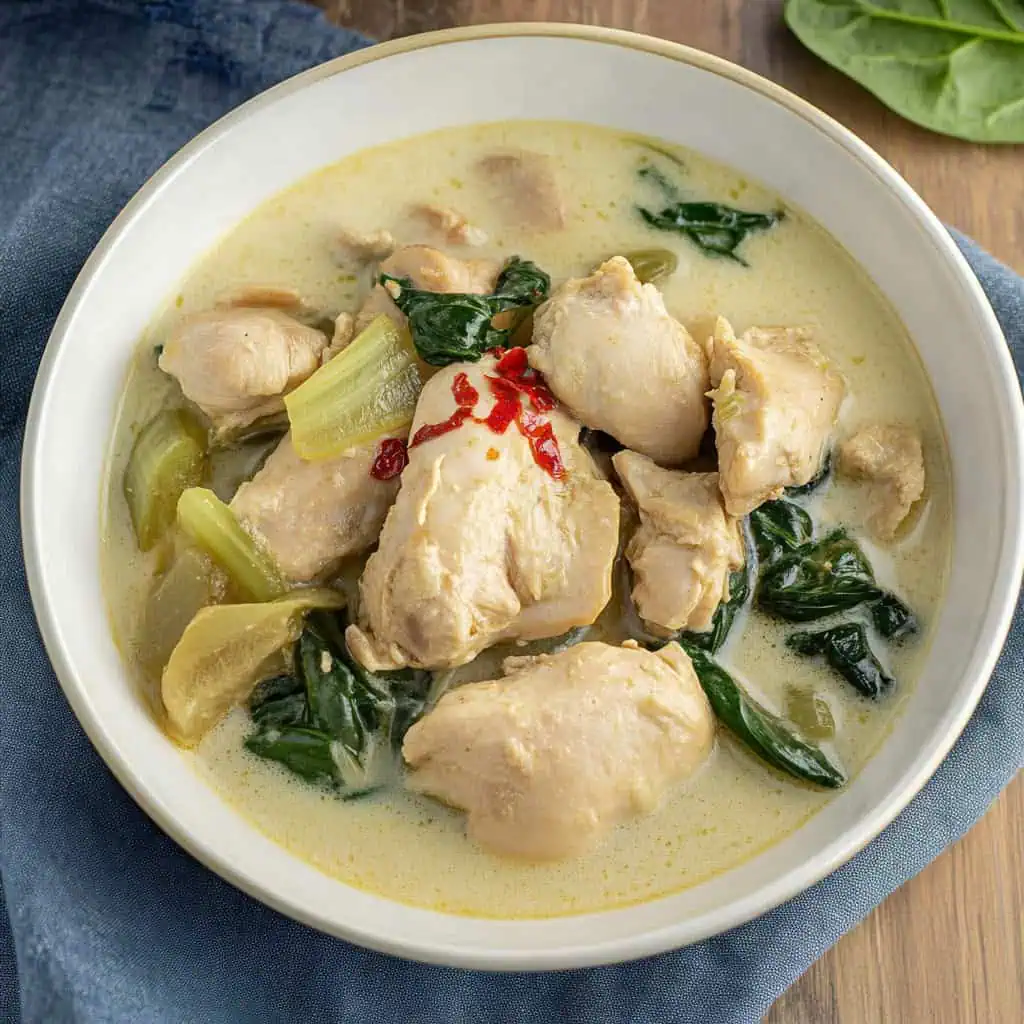
Why You'll Love This Recipe
- Perfectly Balanced Flavors: The rich coconut milk (gata) perfectly balances the heat from chilies
- One-Pot Wonder: Everything cooks in a single pot, meaning less cleanup
- Authentic Taste: Traditional Visayan recipe passed down through generations
- Customizable Heat: Easily adjust the spice level to your preference
- Budget-Friendly: Uses simple, accessible ingredients
- Nutritious: High in protein and healthy fats from coconut milk
Ingredients
This recipe combines ingredients chosen specifically for their complementary flavors and traditional significance. The chicken provides a tender protein base that absorbs flavors beautifully, while coconut milk delivers creamy richness that balances the heat from Thai chilies.
Lemongrass adds a distinctive citrusy aroma that's essential to authentic Visayan cooking. Green papaya isn't just for texture, it contains natural enzymes that help tenderize the meat. The aromatic trio of onion, garlic, and ginger creates a flavorful foundation, while fish sauce contributes that unmistakable umami depth.
Fresh spinach or malunggay leaves are added at the end for a nutritional boost and vibrant color, completing this perfectly balanced dish that represents generations of Filipino culinary wisdom.
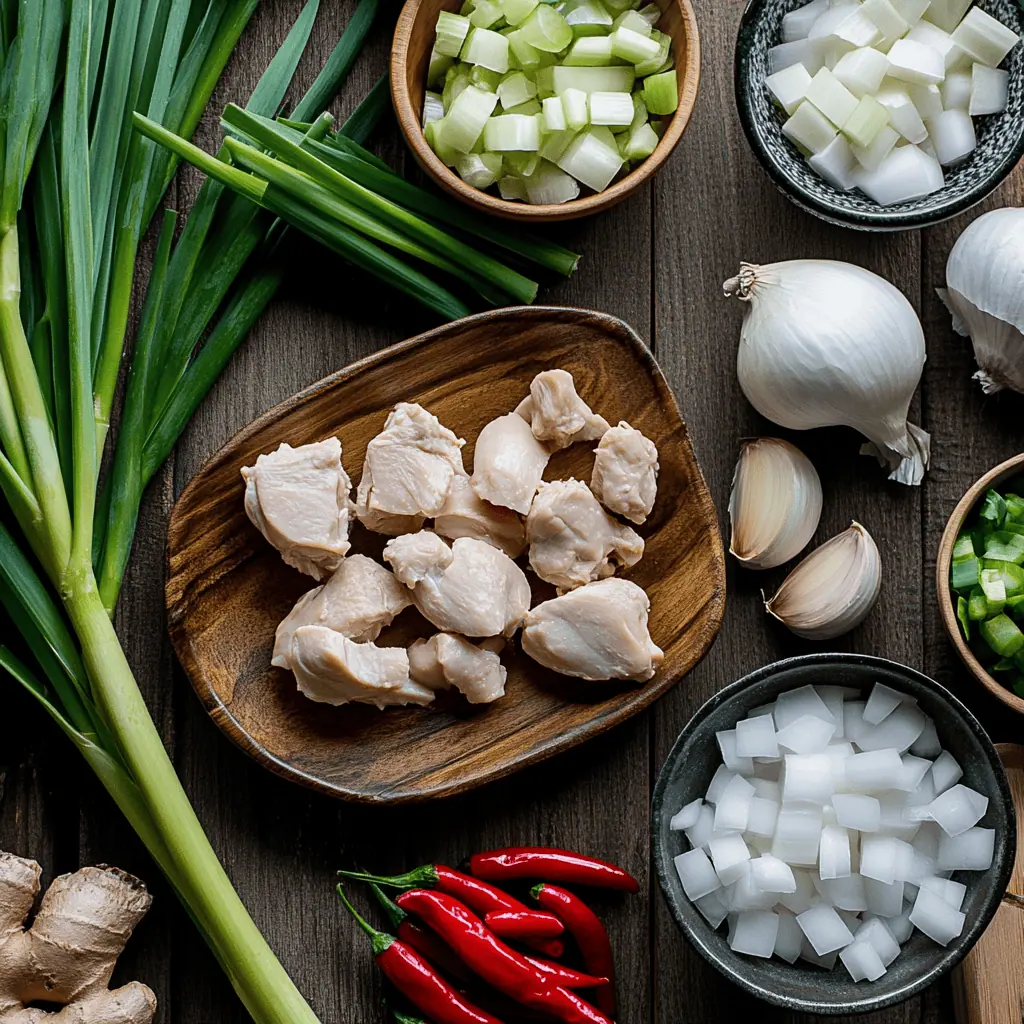
- 1 whole chicken (about 3-4 lbs), cut into serving pieces
- 2 cans (800ml) coconut milk
- 2 stalks lemongrass, bruised and cut into 4-inch lengths
- 1 medium green papaya, cubed
- 1 large onion, chopped
- 6 cloves garlic, minced
- 3 thumb-sized ginger, julienned
- 5-7 Thai chili peppers, chopped
- 2 tablespoons fish sauce
- Salt to taste
- 2 cups fresh spinach or malunggay leaves
- 3 tablespoons cooking oil
Equipment
- Large Heavy-Bottom Pot: Essential for even heat distribution and preventing coconut milk from curdling
- Sharp Knife: For preparing ingredients and cutting chicken properly
- Wooden Spoon: Prevents scratching the pot and perfect for gentle stirring of coconut milk
- Cutting Board: For safe and clean ingredient preparation
- Measuring Spoons: For accurate seasoning
- Mortar and Pestle: Optional, ideal for crushing lemongrass to release essential oils
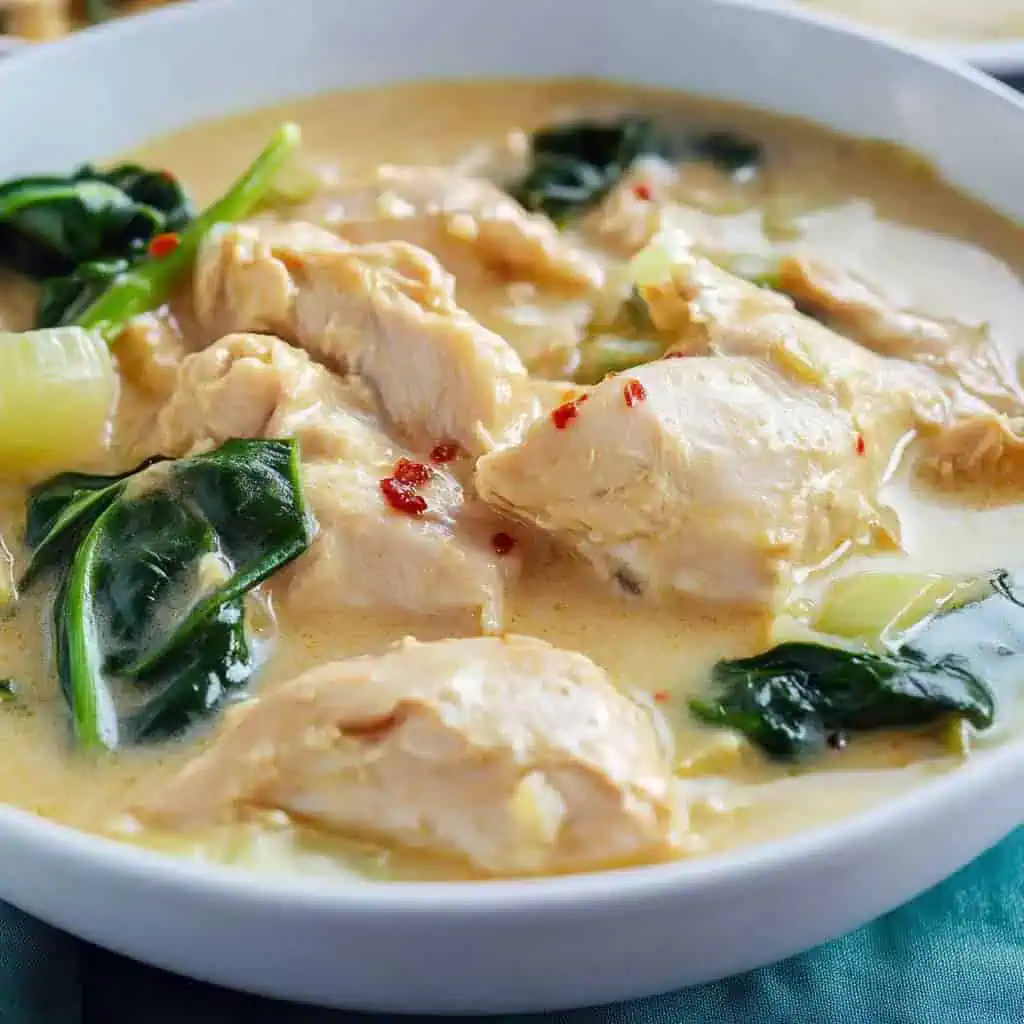
How To Make
- Begin by cleaning chicken thoroughly and cutting into serving pieces. Pat dry with paper towels at room temperature.
- Prepare the aromatics: Bruise lemongrass stalks to release their oils, chop onions, mince garlic, and julienne ginger. Prepare chilies, removing seeds if less heat is desired.
- Heat oil in pot over medium heat. Sauté onions until translucent, about 2 minutes. Add garlic and ginger, sauté until fragrant, about 1 minute. Add chicken pieces and brown on all sides, 5-7 minutes.
- Add coconut milk and bring to a gentle simmer (not boiling). Add lemongrass and chilies. Reduce heat to low and cover. Simmer for 20-25 minutes.
- Add papaya and cook until tender. Season with fish sauce and salt to taste.
- Add spinach in the last minute of cooking, maintaining low heat.

Tips from Lola's Kitchen
For Perfect Coconut Sauce:
- Never let coconut milk boil rapidly as it will curdle
- Stir gently and occasionally using a wooden spoon
- Keep heat low and steady throughout cooking
- Add the thicker coconut cream (if available) at the end for extra richness
For Maximum Flavor:
- Toast ginger and garlic slightly before adding other ingredients
- Bruise lemongrass by smashing with the flat side of a knife before adding
- Use fresh coconut milk when possible rather than canned
- Let the dish rest for 15 minutes before serving to allow flavors to meld
Substitutions
- Chicken: Boneless chicken thighs or drumsticks work well for quicker cooking
- Papaya: Sayote (chayote) or bamboo shoots can be substituted
- Spinach: Malunggay leaves or chili leaves make excellent alternatives
- Coconut Milk: Fresh is best, but good quality canned works well
- Lemongrass: In emergencies, use 1 tablespoon lemon zest plus 2 kaffir lime leaves
- Thai Chilies: Bird's eye chilies or jalapeños (for milder heat)
Troubleshooting
Curdled Coconut Milk
- Problem: Sauce looks grainy or separated
- Solution: Lower heat immediately and stir gently; in extreme cases, transfer to new pot and add fresh coconut milk
- Prevention: Never let it boil rapidly and keep heat consistently low
Tough Chicken
- Problem: Chicken isn't tender after cooking time
- Solution: Simmer longer on low heat, adding small amounts of water if needed
- Prevention: Don't rush the cooking process and ensure pieces are similar in size
Too Spicy
- Problem: Dish is overwhelmingly hot
- Solution: Add more coconut milk or a small amount of sugar to balance heat
- Prevention: Remove chili seeds before cooking and add chilies gradually
Storage & Reheating
Refrigeration:
- Store in an airtight container for up to 3 days
- Allow to cool completely before refrigerating
Freezing:
- Can be frozen for up to 2 months (sauce may separate when thawed)
- Freeze in portion-sized containers for easier reheating
Reheating:
- Stovetop: Reheat on low heat until internal temperature reaches 165°F (74°C)
- Microwave: Heat for 2-3 minutes, stirring halfway through
- Add a splash of coconut milk when reheating if sauce has thickened too much

FAQ
Why is it called Halang-Halang?
The term "halang" means spicy in Visayan dialect, and it's repeated twice for emphasis, highlighting the dish's signature heat.
Can I make this less spicy?
Yes, reduce the number of chilies or remove their seeds completely. You can also serve the chilies on the side for people to add according to their preference.
Why did my coconut milk curdle?
Coconut milk curdles when exposed to high heat or rapid boiling. Always keep your heat low and steady, and avoid vigorous stirring.
Can I use coconut cream instead of coconut milk?
Yes, but dilute it with a bit of water to achieve the right consistency. Using only coconut cream would make the dish too rich and thick.
How do I store leftover lemongrass?
Wrap unused lemongrass in a damp paper towel, place in a plastic bag, and refrigerate for up to two weeks. You can also freeze it for up to six months.
Is this dish suitable for meal prep?
Yes! The flavors actually improve after a day in the refrigerator, making it perfect for preparing ahead of time.
How can I tell when the chicken is fully cooked?
The chicken is done when the meat easily pulls away from the bone and the internal temperature reaches at least 165°F (74°C).
What's the best rice to serve with Halang-Halang?
Plain steamed jasmine rice is traditional, but garlic rice (sinangag) also pairs beautifully with this dish.
Can I add vegetables other than papaya and spinach?
Absolutely! Eggplant, bell peppers, or long beans are all excellent additions that complement the coconut base.
Related
Looking for other recipes like this? Try these:
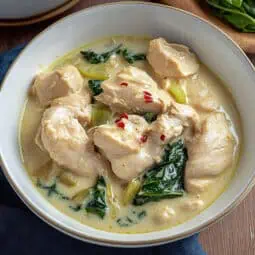
Authentic Chicken Halang-Halang (Manok Halang-Halang)
Equipment
- Large Heavy-Bottom Pot (Kaldero) For even heat distribution and preventing coconut milk from curdling
- Sharp knife (kutsilyo) For preparing ingredients and cutting chicken
- Wooden spoon (sandok na kahoy) To prevent scratching the pot and perfect for gentle stirring
- Cutting board (Tabla) For ingredient preparation
- Measuring Spoons (Kutsara Panukat) For accurate seasoning
- Mortar and pestle (dikdikan) Optional, for crushing lemongrass
Ingredients
- 1 whole chicken about 3-4 lbs, cut into serving pieces
- 2 cans 800ml coconut milk (gata)
- 2 stalks lemongrass tanglad, bruised and cut into 4-inch lengths
- 1 medium green papaya papaya, cubed
- 1 large onion sibuyas, chopped
- 6 cloves garlic bawang, minced
- 3 thumb-sized ginger luya, julienned
- 5-7 Thai chili peppers siling labuyo, chopped
- 2 tablespoons fish sauce patis
- Salt asin to taste
- 2 cups fresh spinach malunggay leaves
- 3 tablespoons cooking oil mantika
Instructions
- Begin preparation by cleaning chicken thoroughly and cutting into serving pieces (Linisin ang manok at hatiin sa serving size). Pat dry with paper towels at room temperature.
- Prepare the aromatics: Bruise lemongrass stalks to release oils (Dikdikin ang tanglad para lumabas ang lasa), chop onions, mince garlic, and julienne ginger (Tadtarin ang sibuyas, dikdikin ang bawang, at hiwaing pahaba ang luya). Prepare chilies, removing seeds if less heat is desired.
- Heat oil in pot over medium heat (180°C/350°F). Sauté onions until translucent, about 2 minutes (Igisa ang sibuyas). Add garlic and ginger, sauté until fragrant, about 1 minute. Add chicken pieces and brown on all sides, 5-7 minutes (Igisa ang manok hanggang maging brown).
- Add coconut milk and bring to a gentle simmer, not boiling (Ilagay ang gata at painitin ng dahan-dahan). Add lemongrass and chilies. Reduce heat to low (160°C/320°F) and cover. Simmer for 20-25 minutes.
- Add papaya and cook until tender (Ilagay ang papaya hanggang lumambot). Season with fish sauce and salt to taste (Timplahan ng patis at asin).
- Add spinach in the last minute of cooking. Maintain temperature at 160°C/320°F.
- When reheating, ensure internal temperature reaches 165°F/74°C (Kapag iinitin, siguraduhing umabot sa 165°F/74°C ang init)
Tips from Lola's Kitchen
- For Perfect Coconut Sauce:
- Never let coconut milk boil hard (Hindi dapat kumulo ng malakas ang gata)
- Stir gently and occasionally
- Keep heat low and steady
- For Maximum Flavor:
- Toast ginger and garlic slightly before adding other ingredients
- Bruise lemongrass well to release oils
- Use fresh, not frozen coconut milk when possible
Nutrition
The Story Behind Chicken Halang-Halang
In the sun-soaked streets of Cebu and across the Visayas, Chicken Halang-Halang stands as a testament to the region's love for bold, spicy flavors. The name itself tells you exactly what you're getting into – "halang" means spicy in Visayan, and it's repeated twice for emphasis, much like how your tongue might feel the double hit of heat from this beloved dish.
While its cousin, the more famous Tinolang Manok, takes a gentler approach with ginger and green papaya, Halang-Halang boldly steps it up by introducing creamy coconut milk and fiery chilies to the mix. This combination isn't just delicious – it reflects the Visayan culinary tradition of transforming simple ingredients into something extraordinary. Local cooks have long understood that coconut milk doesn't just add richness; it also helps temper the heat of the chilies, creating that perfect balance that keeps you coming back for more.
Different towns across the Visayas have their own versions of this dish. In some parts of Cebu, you'll find it made purely with coconut milk and chilies, while in other areas, particularly in Northern Mindanao, cooks might add a splash of vinegar or soy sauce for an extra layer of flavor. Some families even add turmeric (luyang dilaw) for both color and its earthy flavor, showcasing how this dish, like many Filipino recipes, adapts to local tastes and available ingredients.
What makes Halang-Halang particularly special in Filipino cuisine is how it bridges the gap between everyday cooking and special occasions. It's humble enough to be a weekday dinner but flavorful enough to earn its place at fiestas and family gatherings. Today, as more people discover this Visayan gem, it's becoming increasingly popular beyond its regional borders, taking its place alongside other beloved spicy Filipino dishes like Bicol Express and Ginataang Manok.
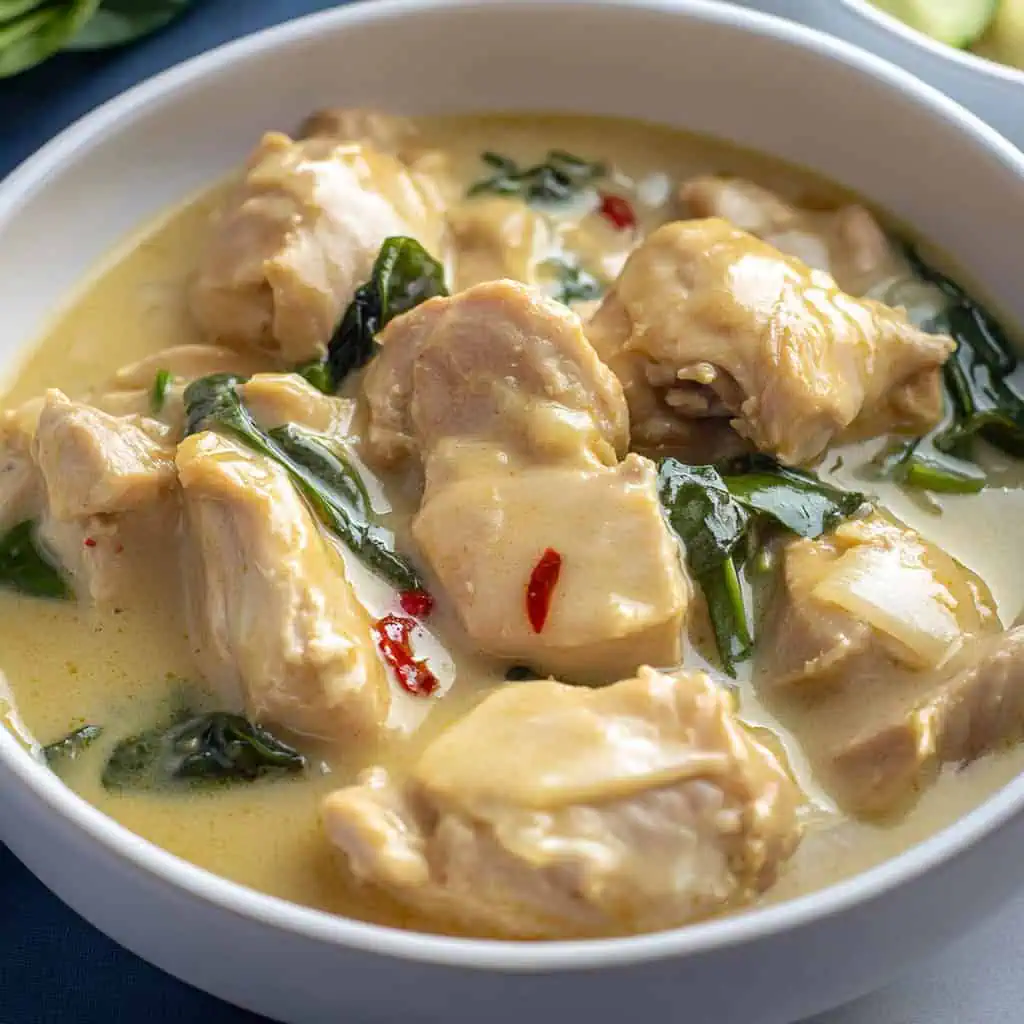

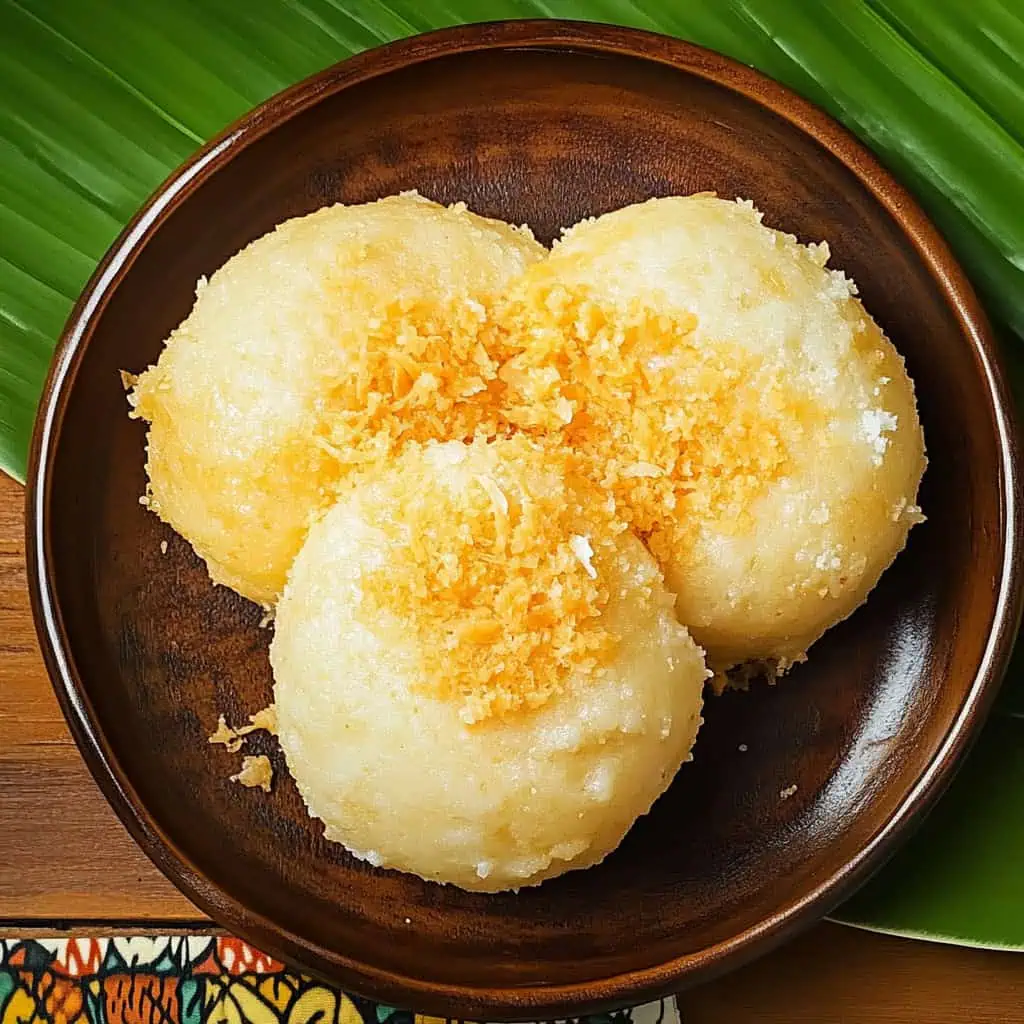
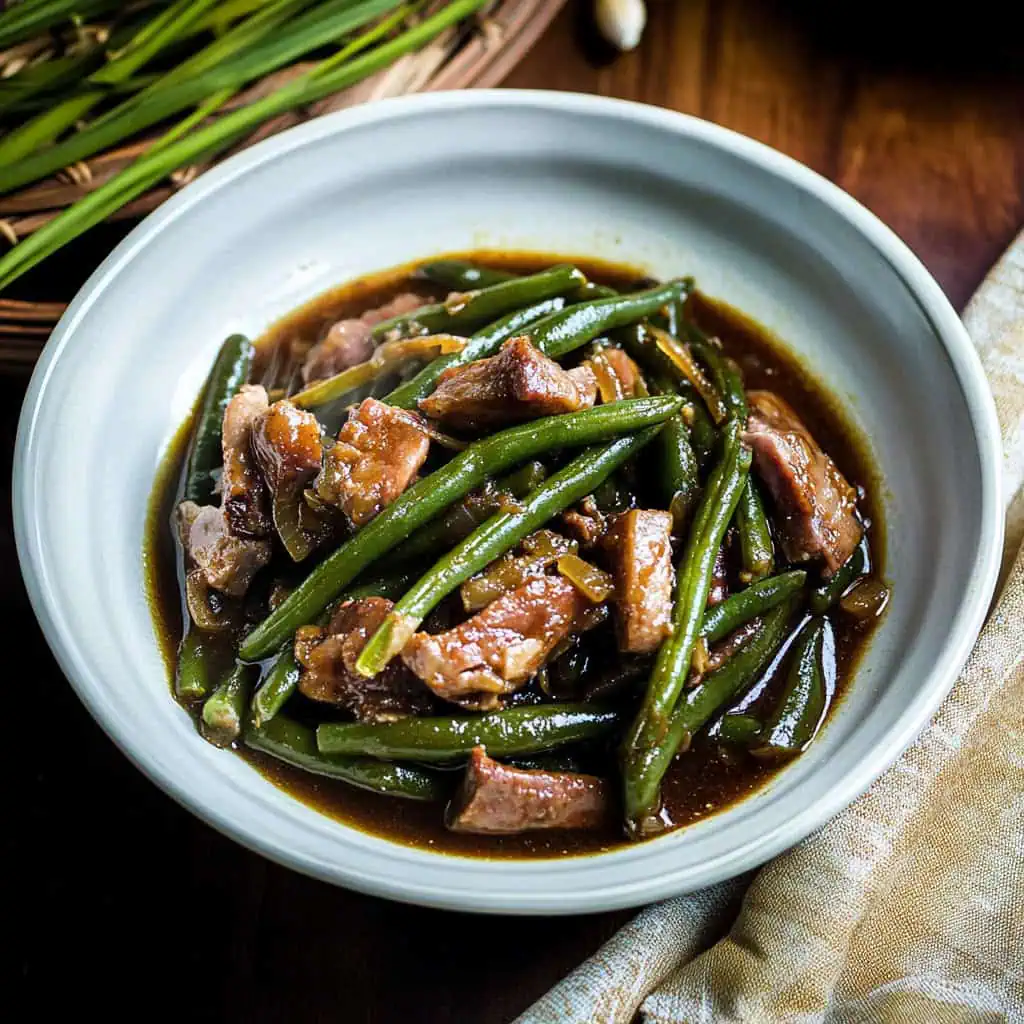
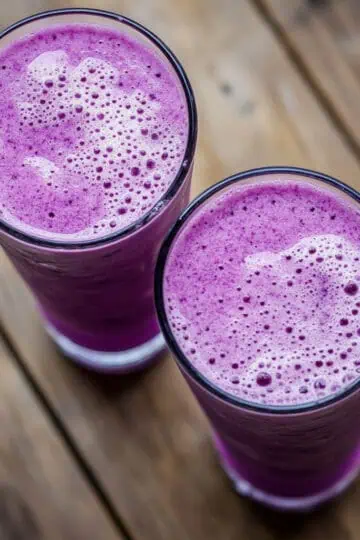
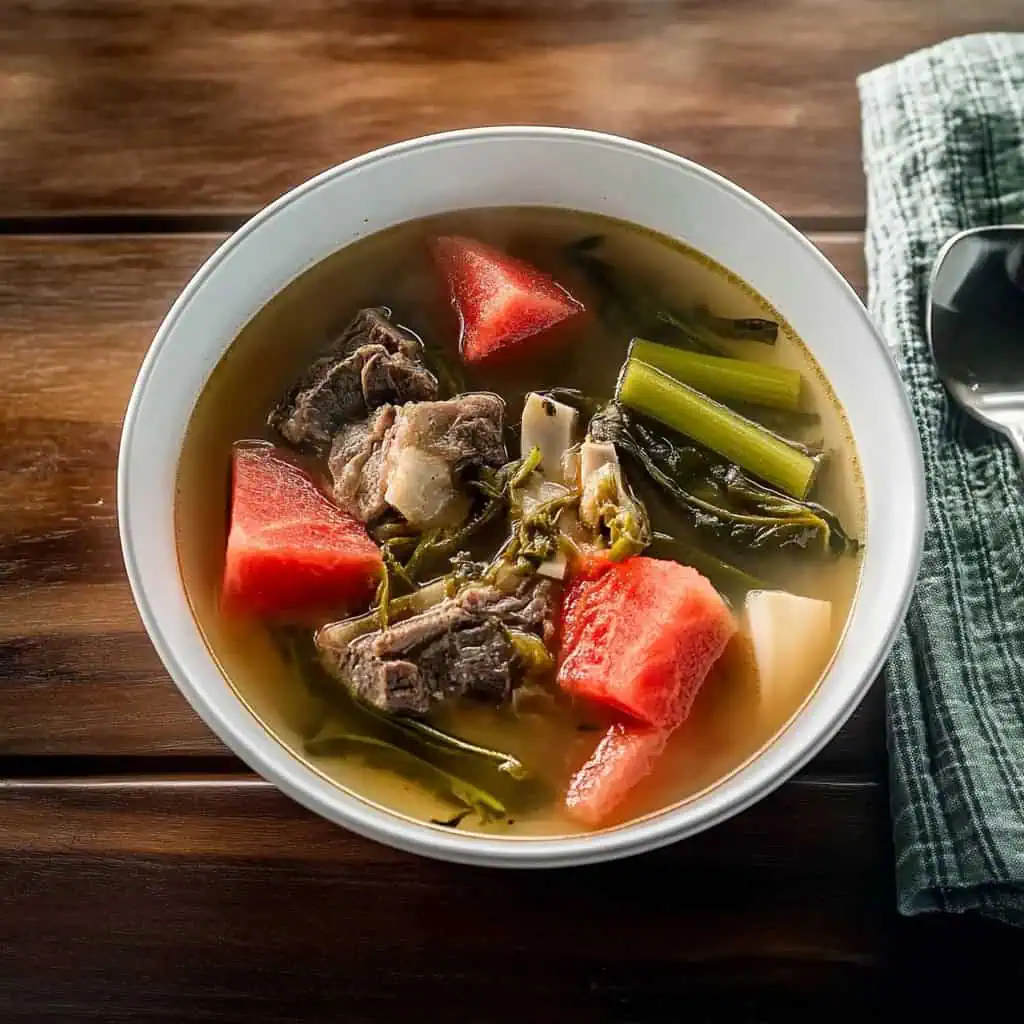
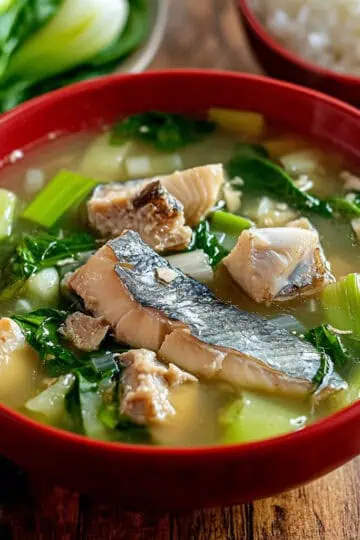
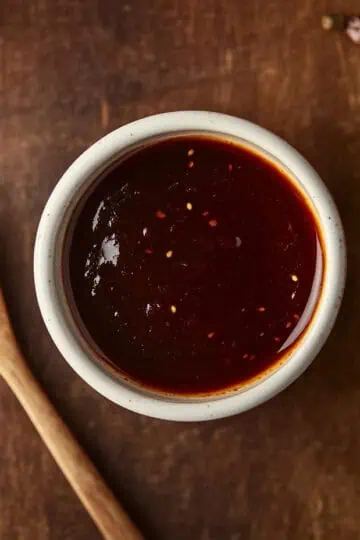
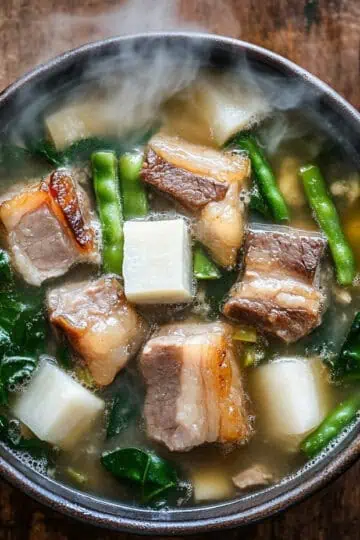
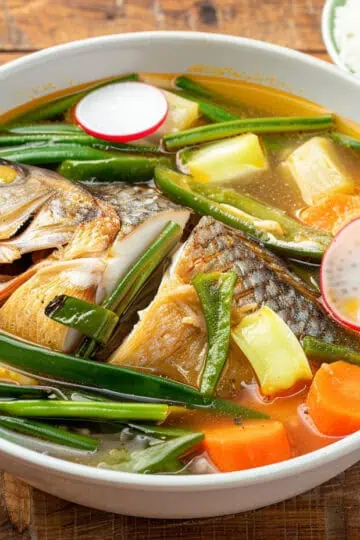
Comments
No Comments